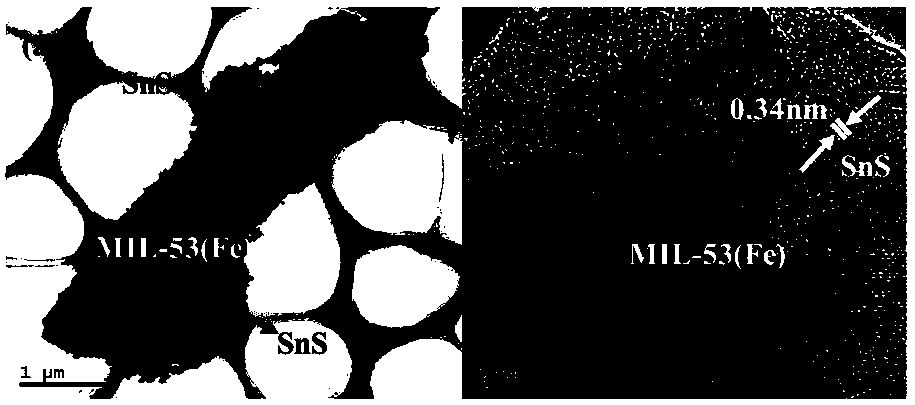Metal organic framework modified tin sulfide composite photocatalyst and its preparation method and application
A metal-organic framework and stannous sulfide technology, applied in the field of photocatalysis, can solve the problems of high electron-hole recombination rate of stannous sulfide, affecting light absorption efficiency, poor photocatalytic activity, etc., and achieve photogenerated electron-hole utilization High efficiency, high practical application value, and high photocatalytic activity
- Summary
- Abstract
- Description
- Claims
- Application Information
AI Technical Summary
Problems solved by technology
Method used
Image
Examples
Embodiment 1
[0041] A metal-organic framework modified stannous sulfide composite photocatalyst, the metal-organic framework modified stannous sulfide composite photocatalyst is supported by a metal-organic framework, and the metal-organic framework is loaded with stannous sulfide, wherein the metal-organic framework is MIL-53( Fe).
[0042] In this example, the mass percentage of MIL-53(Fe) in the metal-organic framework-modified stannous sulfide composite photocatalyst is 6.63%.
[0043] In this example, the specific surface area of the MOF-modified stannous sulfide composite photocatalyst is 23.965m 2 / g.
[0044] In this embodiment, MIL-53(Fe) is rod-shaped, and stannous sulfide is block-shaped.
[0045] The preparation method of the metal-organic framework modified stannous sulfide composite photocatalyst of the above-mentioned present embodiment comprises the following steps:
[0046] (1) Preparation of rod-shaped MIL-53(Fe):
[0047] (1.1) Mix ferric chloride hexahydrate, tere...
Embodiment 2
[0061] A metal-organic framework-modified stannous sulfide composite photocatalyst, which is basically the same as the metal-organic framework-modified stannous sulfide composite photocatalyst of Example 1, the difference being: the metal-organic framework-modified stannous sulfide composite photocatalyst of Example 2 The mass percent content of MIL-53(Fe) in it is 9.95%.
[0062] A method for preparing the metal-organic framework-modified stannous sulfide composite photocatalyst of the above-mentioned present embodiment is basically the same as the preparation method of the metal-organic framework-modified stannous sulfide composite photocatalyst of Example 1, the difference being: the method of embodiment 2 The amount of rod-shaped MIL-53(Fe) in step (2.1) was 15 mg.
[0063] The metal-organic framework modified stannous sulfide composite photocatalyst prepared in Example 2 was named MS-15.
[0064] figure 1 It is the SEM figure of the metal-organic framework modified stan...
Embodiment 3
[0070] A metal-organic framework-modified stannous sulfide composite photocatalyst, which is basically the same as the metal-organic framework-modified stannous sulfide composite photocatalyst of Example 1, the difference being: the metal-organic framework-modified stannous sulfide composite photocatalyst of Example 3 The mass percent content of MIL-53(Fe) in it is 13.3%.
[0071] A kind of preparation method of the metal-organic framework modified stannous sulfide composite photocatalyst of the above-mentioned present embodiment is basically the same as the preparation method of the metal-organic framework modified stannous sulfide composite photocatalyst of embodiment 1, the difference is: embodiment 3 The dosage of rod-shaped MIL-53(Fe) in step (2.1) was 20 mg.
[0072] The metal-organic framework modified stannous sulfide composite photocatalyst prepared in Example 3 was named MS-20.
PUM
| Property | Measurement | Unit |
|---|---|---|
| specific surface area | aaaaa | aaaaa |
| specific surface area | aaaaa | aaaaa |
| concentration | aaaaa | aaaaa |
Abstract
Description
Claims
Application Information
 Login to View More
Login to View More - R&D
- Intellectual Property
- Life Sciences
- Materials
- Tech Scout
- Unparalleled Data Quality
- Higher Quality Content
- 60% Fewer Hallucinations
Browse by: Latest US Patents, China's latest patents, Technical Efficacy Thesaurus, Application Domain, Technology Topic, Popular Technical Reports.
© 2025 PatSnap. All rights reserved.Legal|Privacy policy|Modern Slavery Act Transparency Statement|Sitemap|About US| Contact US: help@patsnap.com



